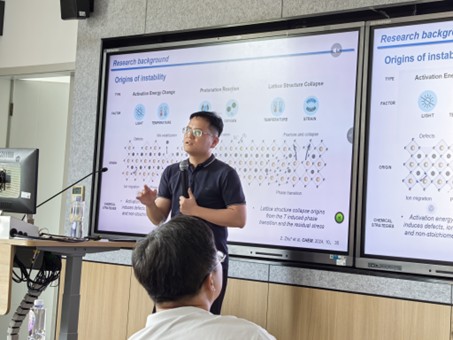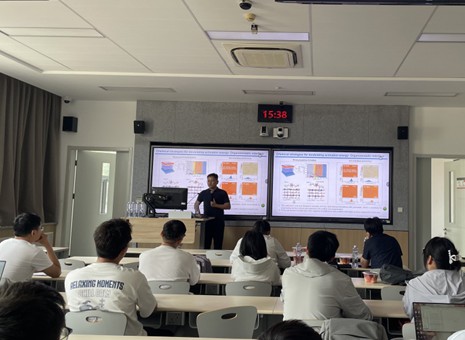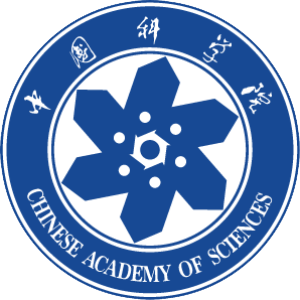At 15:30 p.m. on June 26, 2025, Dr. Zhu Zonglong from the Department of Chemistry at City University of Hong Kong was invited by Professor Huang Hui to give a lecture on the theme of " Advancing the Frontier of Perovskite Solar Cells: Strategies for Enhanced Stability through Interface Engineering", which was held in room 115 of the Teaching Building 1.

Dr. Zonglong Zhu is an associate professor at City University of Hong Kong. 2006-2010 B.S., Department of Chemistry, Nanjing University. 2010-2015 Ph.D., Department of Chemistry, Hong Kong University of Science and Technology. 2015-2017 Postdoctoral Researcher, Department of Materials Science and Engineering, University of Washington, USA. 2017 Visiting Scholar, Hong Kong University of Science and Technology. 2018-present Associate Professor, City University of Hong Kong. Since joining the university as an assistant professor in 2018, he has authored numerous papers as the corresponding author in renowned journals such as Science, Nat. Nanotech., Nat. Commun., Chem. Soc. Rev., Acc. Chem. Res., J. Am. Chem. Soc., Adv. Mater., Angew. Chem. Int. Ed., and others. Dr. Zhu has published over 110 SCI papers, with over 13,000 citations and an impressive H-factor of 50. Dr. Zhu's contributions to the field have earned him numerous accolades. He has been recognized as one of the top 2% of scientists with the most citations in the world in 2021, Emerging Investigator of Nanoscale in 2022, Emerging Investigator of J. Mater. Chem. A in 2021, and Highly Cited Researcher in Cross-Field in 2022. In addition, he has received several awards, including the President's award and Yong research award from the College of Science at CityU in 2022.
As the quest for sustainable solar energy solutions advances, organic-inorganic hybrid perovskite solar cells (PSCs) have captured significant attention due to their high power conversion efficiencies, challenging traditional silicon-based photovoltaics. Despite remarkable progress, the Achilles' heel of PSCs remains their limited long-term stability, a critical barrier to commercial viability. To address this, Prof. Zhu made it clear that understanding the mechanisms of instability and exploring innovative solutions can alleviate these challenges. A promising avenue has been the strategic manipulation of interfaces within PSCs.

Professor Zhu then explained in detail how interface engineering not only mitigates degradation by passivating surface defects but also acts as a defensive layer against environmental degradation. He also dissects the underlying causes of PSC instability, examine the latest breakthroughs in interface modification techniques, and discuss the application of novel materials such as low-dimensional perovskites. The talk aims to illuminate the path forward in enhancing PSC durability, focusing on the integration of cutting-edge interface technologies and their potential to redefine the performance standards of perovskite photovoltaics. Finally, the professor had an exchange and discussion with the teachers and student and received a warm response from the teachers and students on the spot.
